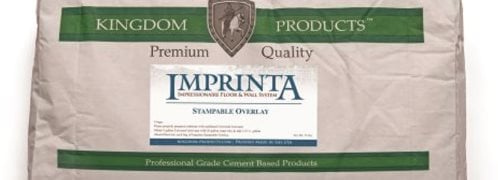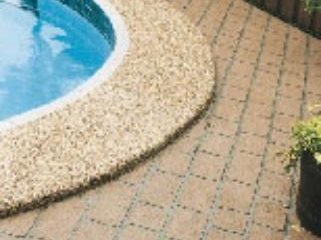- Concrete Overlays Home
- Get the Look - Interior Overlay Pictures
- When to Use a Polymer Overlay
- Comparison Chart of Overlay Systems: Which is best for your project?
- Five Factors to Consider when Choosing a Resurfacing System
- Concrete Overlay Reviews
- Types of Overlays
- Epoxy Coatings
- Microtoppings & Skim Coats
- Self-Leveling Overlays
- Spray-Down Toppings
- Polishable Overlays
- Stamped Concrete Overlays
- Preparing Concrete for Resurfacing
- Concrete Resurfacing
- Reducing Bond Failures Caused by Moisture-Vapor Transmission
- Don't Let Water Vapor Delaminate Your Overlay: How to seal concrete before an overlay
- How-To Tips for Installing Concrete Overlays
- Answers to Common Questions About Concrete Overlays: Advice from expert Chris Sullivan
- How to Add Color to Concrete Overlays
- How to Protect and Maintain Resurfaced Concrete
- Overlay Tools: Seven essential tools for concrete resurfacing
- Related Information
- Concrete Overlay Videos, with Bob Harris
- Decorative Concrete Overlays: A primer of the various overlay types and the decorative possibilities with each
- Vertical Concrete Overlays: Lightweight cement-based overlays mimic stone, brick, and other wall textures
Placing Overlays over Tile Floors
- Question:
-
What is the best self-leveling concrete overlay to apply over ceramic or clay tiles? Do the tiles need to be treated before applying the overlay? - Answer:
-
This will depend on the type of tiles you are going over. Glazed tiles usually require a light sanding to "rough up" the surface. The glaze can often act as bond breaker and is a difficult surface for anything to adhere to. Porous unglazed clay or stone tiles, on the other hand, require no additional preparation.
The other factor to consider is the depth or thickness of the overlay. If you go too thin, the grout lines in the tile floor can ghost through the material. This won't matter if another hard flooring surface will be going over the self leveler, but the ghosting can ruin the appearance of the floor if the self leveler is going to be stained or sealed. If you will be applying the self leveler at thickness less than 1 inch, consider using a crack-suppression membrane or fiber fabric to help eliminate the possibility of ghosting. If the grout lines are deep, use a repair mortar to fill the grout lines and create a level surface.
Related: How to Remove Tiles from a Concrete Floor
Author Chris Sullivan, ConcreteNetwork.com technical expert and vice president of sales and marketing for ChemSystems Inc.
Return to How to Fix Concrete Overlays
 Rapid Set Skim Coat
Repairs, levels, and smooths concrete for applications.
Rapid Set Skim Coat
Repairs, levels, and smooths concrete for applications.
 Thin Micro-Topping
Produces durable surface to color or stain
Thin Micro-Topping
Produces durable surface to color or stain
 Self Leveling Overlay
Find the overlay to meet your project's needs
Self Leveling Overlay
Find the overlay to meet your project's needs
 T1000 Stampable Overlay
For use with resurfacing concrete floors and hardscapes.
T1000 Stampable Overlay
For use with resurfacing concrete floors and hardscapes.
 Kemiko® Buildable Overlay
Decorative interior or exterior resurfacing
Kemiko® Buildable Overlay
Decorative interior or exterior resurfacing
 Flooring & Coating System
Epoxy Flooring System designed for concrete
Flooring & Coating System
Epoxy Flooring System designed for concrete
 Stamped Concrete Overlay
Warm weather and cold weather formulas
Stamped Concrete Overlay
Warm weather and cold weather formulas
 Imprinta Stampable Overlay
2-component system
Imprinta Stampable Overlay
2-component system





